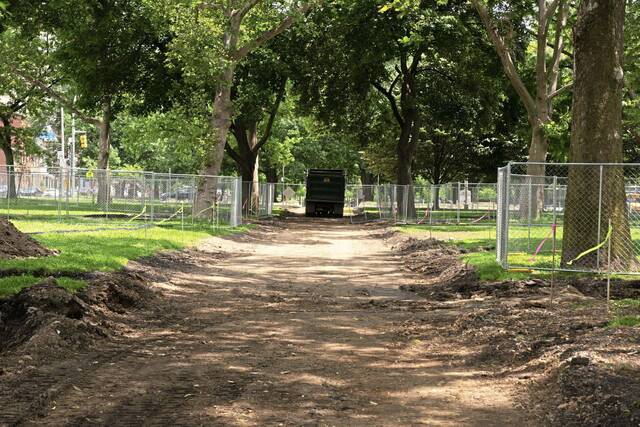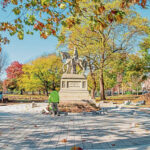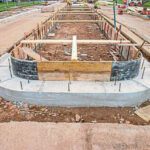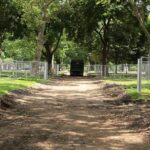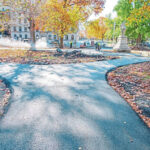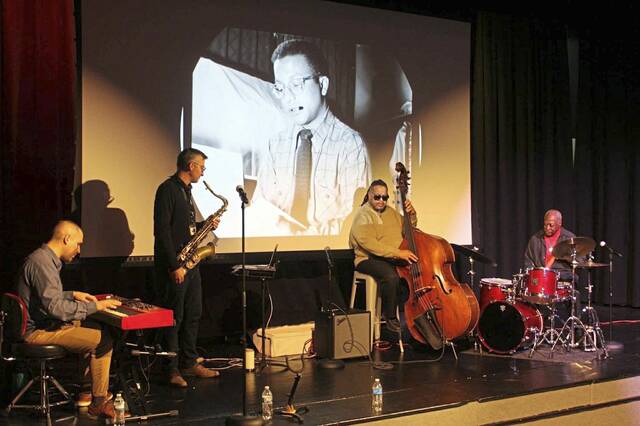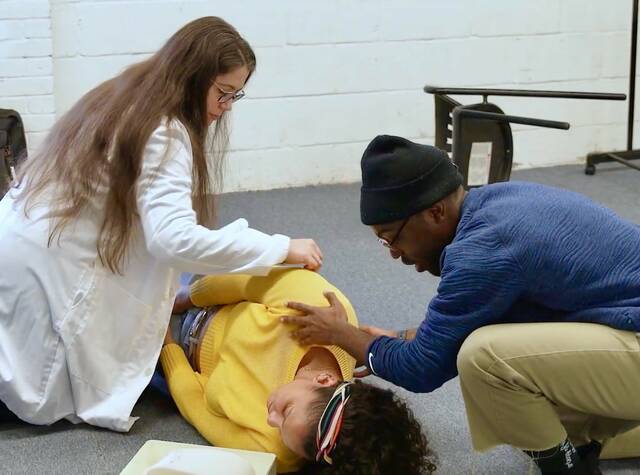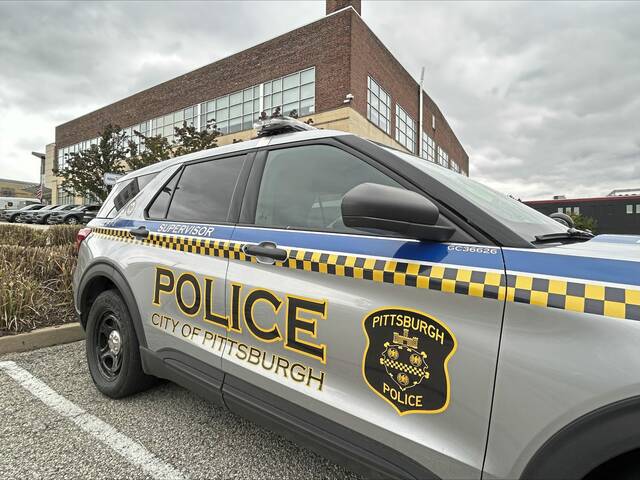The Pittsburgh Parks Conservancy is completing its first project partially funded by the city’s controversial park taxes, with four more projects in the works for the new year.
The 0.5-mill parks tax — or $50 per every $100,000 of a property’s assessed value — was first collected in 2021 after voters narrowly approved it in a 2019 ballot referendum. The tax is meant to provide supplemental funding to the city’s parks, though there have been debates around how exactly the cash should be spent.
Pittsburgh Parks Conservancy CEO Catherine Qureshi said the nonprofit led work on the North Promenade in Allegheny Commons Park in the city’s North Side as a pilot to show how parks tax money could be used to build public-private partnerships.
The project, which is nearly complete, reconstructed a 15-foot-wide central promenade along North Avenue, realigned a system of connecting pathways and brought new lights, benches and trees to the park.
The conservancy completed the work with a $1 million donation from Duquesne Light and $800,000 in money from the city’s parks tax.
Qureshi said the conservancy’s partnership with the city on the Allegheny Commons Park project has “gone excellently” and paved the way for future projects leveraging parks tax money and private dollars. The project is wrapping up on time and on budget, she said.
Community members voiced a desire to use the park after work hours to take walks and meet up with people, she said. Improving the promenade and adding more lighting and pedestrian safety enhancements, she said, went a long way to making the park more accessible and welcoming.
“We are grateful to the city. We’re grateful to the citizens and park users,” Qureshi said. “It’s something I think we can all be proud of.”
The conservancy will maintain an ongoing presence in the park, she said, even after this specific project is finished.
The parks tax money from the city helped the conservancy to extend the scope of work under the project, said Brandon Riley, the conservancy’s capital projects manager. The conservancy previously had completed promenade restoration work in another portion of the park. Construction began in July and initially was to extend from Federal Street to Arch Street. Parks tax dollars enabled the conservancy to stretch the work to the George Washington Monument.
“We really wouldn’t have gotten as far as we did without the city chipping in,” he said.
Improving safety
The park will be more usable and safe, Riley said. Previously, there were no lights between Federal and Arch streets, and people “just didn’t use that park at night.”
There also were concerns surrounding pedestrian safety.
The conservancy teamed up with the city’s Department of Mobility and Infrastructure to create mid-block crossing that aligns with the promenade. It includes painted medians in the middle of Arch and Federal streets that help slow down drivers, allows pedestrians to stop between lanes and makes the road feel “a little more park-like.”
The project included planting new trees, as the mature trees now there are “aging and they will start to die off,” Riley said. It also brought new benches and trash cans to the park.
“We’re excited to give Allegheny Commons the refresh and restoration it needs,” Riley said. “It’s the oldest park in the city and one of the oldest parks in the state, so it’s a unique asset.”
Qureshi said Allegheny Commons Park was a fitting spot for the conservancy to launch its first parks tax-funded project. It’s an area where the conservancy already had a presence — and will continue to be active — and the project had strong support from the community and city leaders.
It is situated in North Side communities that were identified by the Department of Environmental Protection as Environmental Justice Areas, with 20% or more of the population living in poverty and 30% or more identifying as a minority.
In 2024, the conservancy is set to receive about $1.3 million in parks tax money for four additional projects.
“It seems like a very natural, incremental but meaningful growth,” Qureshi said.
The 2024 parks tax allocation includes $330,000 to support the construction of a community grove with benches and space for youth organizations to host events in McKinley Park. Qureshi said the conservancy has worked to foster “an excellent relationship” with the surrounding community, which ranks high on their equity index as a park in need of additional investment.
The conservancy also will receive more than $700,000 to help fund a project that will resurface pathways, install lights and enhance entrances at Mellon Park. The project aims “to create that sense of welcome and connection and this park is for everybody.”
An additional $130,000 is set to help rehabilitate the 1940s-era Valley Refuge Shelter in Riverview Park.
The city’s parks tax money also will provide $200,000 to support an ADA-accessible, sensory-friendly space for children with physical or cognitive disabilities in Frick Park.
“This one was interesting because this is equity from a different lens,” Qureshi said, explaining that they typically look at providing equity to parks based on their locations within underserved communities.
This project aims to provide an inclusive park experience for the disability community, she said.
“It’s equity beyond geography,” she said. “It’s ability equity.”
Construction on the Frick Park sensory classroom project and Valley Refuge Shelter in Riverview Park should begin in 2024, Riley said, while the other projects slated to receive park tax funding in 2024 are “longer term” and likely will continue into 2025.
Riley said the conservancy also will be bringing additional funding to each of those projects, based off the model the city and conservancy used in the Allegheny Commons project this year.
“This project is a good example of public-private partnership and how tax dollars can be used with private donations,” he said. “Sometimes it takes a village.”
Related:
• Report questions how controversial Pittsburgh parks tax money is spent• Work begins on next phase of improvements in Pittsburgh's Allegheny Commons Park
• Duquesne Light donates $1 million to Allegheny Commons Park project




